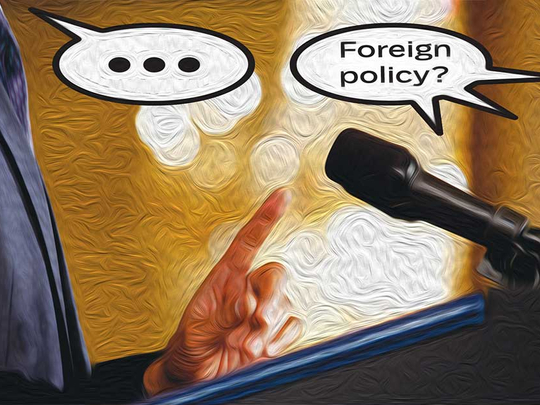
Much has been made during the general election campaign about the reluctance of the main political parties to acknowledge defence as a major issue. But what about that other, equally vital, subject that is also being studiously ignored — namely foreign policy? There have, it is true, been a few desultory exchanges over the future of Britain’s relationship with the European Union (EU), with Ed Miliband, who claims he wants to keep Britain “firmly” at the heart of the EU, taking the issue with Prime Minister David Cameron’s pledge to hold an “in-out” referendum on British membership.
Nick Clegg, meanwhile, has deftly side-stepped the issue, no doubt hoping his equivocation may lead to a second coalition deal with the Tories. But what about the legion other pressing international issues that daily dominate the headlines, yet have failed to provoke any meaningful response from those who are vying for the responsibility to define Britain’s global outlook after May 7?
It is not as though there is any shortage of suitable subjects for discussion. The drowning of migrants in the Mediterranean; US warships being deployed off the Yemeni coast to prevent Iran supplying arms to Houthi rebels; British troops and Royal Air Force jets taking part in Nato war games in the Baltic to send a warning message to the Russian president, Vladimir Putin. These are just some of the many foreign policy issues that have a direct bearing on Britain and its place in the world, subjects that, in normal circumstances, would have politicians of all ideological persuasions vying to fill the airwaves with their views.
Yet, as the campaign enters its closing stages, it is as though the outside world has ceased to exist, and that the only subjects worthy of discussion are how much money the parties intend to spend on bailing out the National Health Service (MGS) or how much of a threat Nicola Sturgeon and the Scottish National Party (SNP) pose to the future of the United Kingdom.
Cameron’s reticence on global security issues is particularly surprising given that, early on in his premiership, he sought to position himself as a leading player on the world stage. One of his first acts as prime minister was to sanction the Obama administration’s controversial decision to end combat operations in Afghanistan by the end of last year, even though it risked jeopardising the mission’s ultimate objective, which was to get the Taliban to reach a peace deal with Kabul.
Last week’s suicide bombing in Jalalabad, which killed 33 people, certainly suggests the conflict has a long way to run. Following his Afghan decision, Cameron then emerged as one of the leading cheerleaders for the military campaign to overthrow Libyan dictator Muammar Gaddafi, as well as calling for the removal of the region’s other long-standing dictators, such as former Egyptian president Hosni Mubarak and Syrian dictator Bashar Al Assad.
Indeed, Cameron’s enthusiasm for regime change in the Arab world resulted in the disastrous Commons vote in the summer of 2013, when MPs vetoed Downing Street’s attempts to bomb the Al Assad regime. The folly of this approach can now be seen in the fact that the moderate Free Syrian Army, which was established to fight the Al Assad regime, is now being trained by British military personnel to fight Daesh (the self-proclaimed Islamic State of Iraq and the Levant), which now controls large swathes of northern Syria and Iraq.
Cameron’s track record in Libya is also coming under intense scrutiny, following the recent migrant drownings in the Mediterranean Sea, where thousands are believed to have died at the hands of Libyan-based people-trafficking gangs. In the immediate aftermath of Gaddafi’s overthrow, I was inundated with senior Tory ministers telling me how the campaign, unlike Labour’s wars in Iraq and Afghanistan, represented the perfect template for future military interventions: No boots on the ground, no British casualties and all the mission objectives achieved within a relatively short time.
Such was the Coalition’s enthusiasm to portray Libya as a success story that Philip Hammond, the then defence secretary, even urged British businessmen to “pack their suitcases” and head to Tripoli in search of lucrative deals. No senior Tory would try to peddle that line today. Instead, William Hague, who was foreign secretary at the time, spent last Tuesday trying to argue that Gaddafi’s overthrow had not caused the present crisis. After all the criticism the Tories have attracted over their drastic cuts to the defence budget, it is not difficult to understand why, with such an indifferent track record in world affairs, they are keen to steer the debate away from foreign policy.
If that is the case, then why is Miliband helping them to avoid scrutiny by not making their woeful record a major election issue? Having opposed the Syrian intervention in 2013, Miliband could at least claim he showed a modicum of judgement. But Miliband, like the rest of his party, is uneasy about raising an issue that inevitably begs uncomfortable questions about Labour’s own record in Iraq and Afghanistan.
Thus, rather than allowing a serious debate on their competence to govern, the Tories and Labour both hope that, by maintaining a discreet silence on foreign policy, their respective shortcomings will be kept from the public gaze.
— The Telegraph Group Limited, London, 2015












